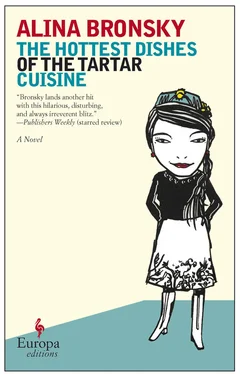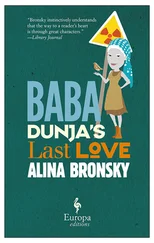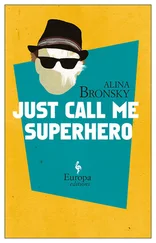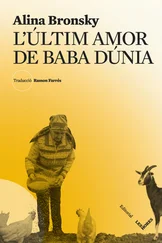“Say something,” I pleaded with my husband as he sat there in the kitchen chewing stuffed cabbage that evening.
“We have to make sure they don’t take away our second room now that there are two fewer people here,” he said.
He had no idea where she could have gone. For the first week, I kept waiting for a call from her, or at least from the police. The telephone was in the foyer, where all the inhabitants of our apartment could use it. I was the first one there every time it rang, but Sulfia didn’t ring and neither did anyone else.
By the second week I began to feel sick. I dreamed of Aminat, hungry and half-frozen, sitting in her crib and crying. Of how it wouldn’t register with Sulfia because she would be doing some stupid task or other while Aminat suffered.
“You have to call Sulfia at work,” I demanded of my husband as he gnawed on a chicken leg one evening. “You have to find out where she moved.”
My husband said our daughter was an adult.
“But Aminat’s not!” I shouted, and he looked up from his plate.
A week later I put on my maroon dress, let down my hair, made up my eyes and lips in the mirror, and took the trolley to the surgical clinic where Sulfia worked. I prayed she still worked there. I took up a spot in front of the entrance where a few poor, sick people in gray hospital gowns were also standing around breathing in the fresh air. I waited.
God rewarded me and sent Sulfia out after just two hours. She had on the old blue jacket that she’d been wearing since her school days and was carrying a mesh bag. In the bag I glimpsed five shriveled potatoes. It had always been impossible to send Sulfia shopping, especially to the green grocer. She let the worst, most rotten things be foisted on her without ever noticing.
When Sulfia saw me, her eyes opened wide, darkened, and took on a purplish hue. It made her eyes the color of overripe plums. She tried to retreat, but I made a beeline for her and grabbed the sleeve of her wretched coat.
“Where are you going, you turd?” I asked her with a friendly civility only I could muster in such a situation. “Where have you taken Aminat, you traitor to motherhood?”
She squirmed in my grip.
“Anja is my daughter,” she squeaked.
“Since when?” I said, my voice rising.
The poor, sick people followed our conversation with intense interest. Sulfia made it difficult for them, however, because she mumbled so much it was impossible to understand her. I had always told her: you must speak clearly and articulate. She murmured that I had alienated her child from her. That I had tormented her. That she was so happy to be free of my tireanny. (“Tyranny,” I corrected her.) That she’d rather live under a bridge than under the same roof with me.
“WHERE IS AMINAT?” I raised my voice a little more.
Sulfia began to talk as if she were crazy: she was the mother of her daughter, she didn’t recognize me anyway, had never seen me before in her life, she had no idea who I was, I should leave immediately, I shouldn’t come near her or her child, it was enough that I had ruined her life.
“You’ve found a man!” I realized, now genuinely surprised.
The sick people craned their necks and one whistled appreciatively.
“Finally!” I shouted. “Good! But where is Aminat?”
At this point Sulfia pulled herself free, opened her scrunched mouth into an irregular oval, and screamed: “Help! She’s going to kill me!”
Shocked, I let go of her sleeve.
Sulfia broke off her steam-whistle cries and ran. I watched her go. I could have gone in, found her workstation, and asked her colleagues for her new address. But who knew what Sulfia, sneaky as she was, had told them about me. I put my hair up into a sober bun with four hairpins and slowly got going.
My stupid daughter walked ahead and I followed. Her blue coat pointed my way. When she climbed onto a tram, I got into the second car. As usual she didn’t notice anything. Through the window of the trolley car I saw how she slumped into a seat with a blank look on her face.
A few stops later she stood up and got out. I hopped off behind her.
I followed her a few steps behind. Then she turned and went through a squeaky door and into a gray high rise. I recognized it immediately. It was the dorm for rural students who came to the city to train for hospital jobs and look for work and, first and foremost, for a husband. This was where Sulfia had moved, and no wonder. Even a much smarter person could not have found a real apartment in the city so quickly, and Sulfia wasn’t smart — she wasn’t even clever. She was a danger to herself and others. But she was a half-nurse, and somebody had obviously taken pity on her and assigned her a bed. Somewhere in this stinking dump was my beloved grandchild.
I asked the woman who guarded the entryway for the room number of Sulfia Kalganova. I said Sulfia had kidnapped a child. The woman readily took me to my destination, up many flights of stairs, down long, dark hallways. Along the way she told me stories from her mess of a life. I listened and offered halfhearted responses so she would continue to lead the way.
The room was small and dirty. Aminat sat in a crib and looked at me. Her face and body were covered with green spots. She had chickenpox; I recognized it right away. I knew children’s diseases well, along with so many other things. Sulfia was sitting on her bed with her hands over her face. Her shoulders trembled. And all of this because she hadn’t listened to her mother.
When Aminat saw me, she grabbed the bars of the crib with both hands and began to rattle them. Sulfia sprang to her feet, aghast, but I shoved her away. She bounced off my elbow and fell over. That’s how awkward she was.
I pulled my little girl out of the bed, grabbed the tattered blanket, and wrapped it around the child. Aminat clasped my neck.
I carried my priceless bundle out of that hellish building, flagged a private taxi, and rode home. A grandmother who had just rescued her grandchild. I didn’t have anything against my daughter Sulfia. I was happy to live as a family in our two rooms. Mature parents, young inexperienced daughter, little grandchild. It all fit. I was a fundamentally generous person, and I valued the interchange between generations. Helping support Sulfia in raising my grandchild didn’t bother me at all. Neither did drawing Sulfia’s attention to her own frequent mistakes. All I ever wanted was for her to improve herself.
What had happened now, however, was just not acceptable. Sulfia had endangered the child. She had left her alone and sick and had gone off to work. Of course she hadn’t been able to find a new kindergarten for her. She had infected Aminat with chickenpox she probably brought home from the clinic — despite her medical training she didn’t understand basic hygiene.
My mission was to save Aminat from squalor. Nobody else was going to do it. To every other person on earth, Aminat was nothing more than a neglected, unkempt little snot. It wouldn’t have been long before she had abscesses and lice.
As far as I was concerned, there were no two ways about it: Aminat would stay with me.
For a while after I’d saved Aminat, Sulfia didn’t have the heart to come by our place. She just called constantly and sobbed into the phone. Eventually she quit saying anything at all, but kept on calling. The phone would ring and all I’d hear when I answered was crackling. It disturbed Aminat’s afternoon nap, so I unplugged the phone.
I sent Kalganow to re-register Aminat in her old kindergarten, but it turned out to be difficult. It was only possible with the consent of the mother, as she had the right to custody. I thought about ways to relieve Sulfia of this right. It would certainly have been better for all parties — better for her, for Aminat, and, of course, for me. But Kalganow said a trial like that would hurt both me and him professionally, as everyone would then find out what an awful daughter we had produced. I gave Kalganow a big bouquet of gladiolas from my garden and told him to give it to the principal of the kindergarten and to compliment her. The obstacles to registration evaporated.
Читать дальше












